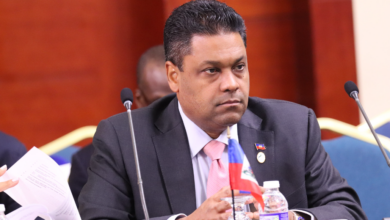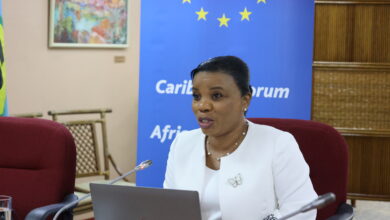The Hon Prime Minister Basdeo Panday;
The Hon Deputy Prime Minister of the Netherlands Antilles;
President of the Senate of Trinidad and Tobago;
Honourable Ministers;
Mr. Jose Antonio Ocampo, Executive Secretary, ECLAC;
Secretary- General of the ACS;
Dr. Len Ishmael, Director, ECLAC Sub-Regional Office in the Caribbean;
Members of the diplomatic Corps;
Other Distinguished Guests;
Ladies and Gentlemen.
I wish to begin by thanking the Director of the Port-of-Spain Office of the Economic Commission for Latin America and the Caribbean (ECLAC), Dr. Len Ishmael, for affording me the opportunity and the honour of making a few remarks on this occasion marking the 25th Anniversary of the establishment of the Caribbean Development and Cooperation Committee (CDCC). In extending this honour to me, the distinguished Director however, unknowingly led me to have to recall some personal history linking me closely to both ECLAC and the CDCC.
First of all, as a student of economics at the UWI Mona Campus in Jamaica in the early 60s, I was among the many disciples – as I suspect so was my colleague, the Secretary- General of the ACS – of the then new Structuralist school of development economic thought to which the Economic Commission for Latin America – ECLA – had given birth.
Names such as Raul Prebisch, David Felix, Osvaldo Sunkel and others became our virtual mentors, feeding our intellectually rebellious hunger for a more relevant paradigm of economic development thought than that of the Adam Smiths, David Ricardos and others of their era, which was then still too much the standard fare. Little did I know then that nearly two decades later, I would be offered the opportunity of heading the ECLAC Office in Port of Spain. Even less did I know then that I would have had to turn down such an attractive offer.
I recall well the occasion, meeting in Rome with the then Executive Secretary of ECLA – the current President of the Inter American Development Bank – on the very day that the 1982 World Cup started. I was then the Deputy Secretary General of the African, Caribbean and Pacific (ACP) Group of States serving in Brussels. Having served the Group from 1976, I thought that I had made my contribution and would have been quite happy to return home to the Region then.
The ACP Group had other views – strong views. To me, however, the subsequent alternative of being afforded the opportunity of serving as Secretary General of the ACP, while deeply appreciated, never did altogether compensate for the opportunity which I had to forego.
Had this been all that linked me to this occasion, I would not have bothered to mention it. But the linkage goes deeper. As a much younger man, then, as now, working at the CARICOM Secretariat, I had the good fortune to be here in November 1975 in this very Chaguaramas Convention Centre – then not as resplendent as it is now- when the then Prime Minister of Trinidad and Tobago, the late Dr. the Honourable Eric Williams, launched the Caribbean Development and Cooperation Committee (CDCC). It is therefore fitting that we have returned to this very venue to commemorate this auspicious occasion.
Many then did not appreciate the full significance of that initiative – perhaps the vision was too distant for most to see. That the CDCC is today celebrating its 25th Anniversary is therefore not only a moment for congratulations, but also one for reflection on its achievements as well as on its prospects.
As is so well stated in the discussion paper, “The CDCC into the New Millennium”, the inauguration of the CDCC was seen as marking “…a watershed in the management of Caribbean issues within the United Nations System”. Henceforth, activities related to the Caribbean were expected to be conducted “…on the basis of ideas, principles and strategies defined by the sub-region itself”.
If one were to review the number of UN agencies and the various UN relations in and with the Region, there is more than prima facie evidence of the success of the CDCC in this primary objective. Further, if one were also to observe the regularity and ease with which regional institutions now extend beyond linguistic barriers- the ACS, the CDB, the CTO and CARICOM itself – the pioneering design of the CDCC cannot be denied its primary place in this historical development.
In congratulating the CDCC, one may wish to begin however by congratulating it for having survived in the dramatically changing Caribbean environment in which many an institution has been spawned, only to wither on the vine and die. One needs only to recall in that long list, the West Indies Federation, the Caribbean Investment Corporation, the West Indies Shipping Corporation, and so forth.
The CDCC has survived, I am convinced, because first of all, it was relevant to the Region’s needs at the time. In concept, it sought to span the Caribbean, not just the West Indies. Its vision was clearly not limited to that of an English-speaking West Indian enclave, now evidently not viable neither as an economic entity, nor a political entity at that. It recognised the historical and geographical reality which was later to drive the development of CARICOM and the establishment of the Association of Caribbean States (ACS).
Today, all this is no doubt self evident. In 1975, it was not necessarily so. It must particularly not be forgotten, for example, that the CDCC vision commenced with, and includes not only Cuba – then the Caribbean centre of a Cold War front – but also a Dominican Republic and a Haiti – the former commonly seen then only as a Spanish-speaking country of dictators and coups d’etat; and the latter, as an increasingly impoverished French-speaking historical dictatorship.
As for the small Netherlands Antilles territories, they were not generally seen as significant in any way, the oil of the Arubas having long been exhausted. (We all know better.) But yet the CDCC vision encompassed all of these. It had broken the development perimeters of an English-speaking Caribbean region to include significantly non- English-speaking nations – a vision as relevant today as it was then.
The relevance of the Caribbean Development and Cooperation Committee relates as much to its basic objective as to its territorial coverage. A close study of its carefully chosen name – Caribbean Development and Cooperation Committee – reveals that in ” Caribbean”, it defines the perimeter of its borders; in “Development”, it specifies clearly its objectives; in “Cooperation”, it identifies its indispensable method of functioning; and in “Committee”, it recognises its sub-group – but not appendage – status to the larger Latin American region.
This latter facet – the status of a relationship between the Caribbean Members of ECLA and the larger Latin American Group – was undoubtedly an issue of concern at the time of the creation of the CDCC. It must be recalled that it was a time of significant ferment in the developing world, giving rise to many of the developing world’s initiatives, ranging from efforts for a New International Economic Order, to the Organisation of Petroleum Exporting Countries, to the First Lome Convention and others. The CDCC was itself evidence of this stirring in the Caribbean sub-region. The conversion of ECLA to ECLAC was one evident result.
CARICOM/ ECLAC Cooperation
A few words about CARICOM-ECLAC cooperation:
While the scope and relevance of the CDCC has contributed significantly to its survival and success, perhaps the single most influential factor in all this was the far-sighted decision to have the Port-of-Spain office of ECLA serve as the Secretariat of the CDCC. This relationship constitutes the main linkage between the CDCC and CARICOM, a relationship which springs from two main factors: one, the virtual commonality of membership between the CDCC and CARICOM – all CARICOM States are members of CDCC; and the other, the shared objectives and functional relationship with the CARICOM Secretariat, of the Secretariat of the CDCC – the Port of Spain Office of ECLAC. This latter was later to formalise its longstanding relationship with CARICOM through a cooperation agreement with the CARICOM Secretariat in 1998, which I had the honour to sign on behalf of CARICOM – further deepening my own personal relationship with the CDCC.
It is also particularly this dimension of the CDCC mechanism which has served to provide the real operational bridge between CARICOM and the CDCC. In pursuit of its mandate as the technical Secretariat of the CDCC, the ECLAC Office in Port of Spain has not only established and maintained institutional/ professional links with the CARICOM Secretariat, it has strengthened those links to our mutual benefit, as it has no doubt done with the Secretariats of the OECS and indeed, the new ACS. At the technical/ professional level therefore, coordination, harmonisation and cooperation between CARICOM, the ACS and the CDCC seem secure for the future, and can prove even more beneficial as the autonomy of the Port of Spain Office within the overall Economic Commission for Latin America is strengthened.
At the political level, with the existence of the extensive political directorate of the Caribbean Community and that of the Association of Caribbean States, within which fall all Members of the CDCC, an important issue which a post-Twenty-Fifth Anniversary CDCC/ECLAC must now address is the vital necessity to ensure harmonisation and coordination of the political directorate of the CDCC with that of the political directorates of both CARICOM and the ACS, especially in the context of a changing United Nations system.
Ladies and Gentlemen, while such fundamental issues are critical, I would wish today, to join the CDCC and ECLAC in celebrations, rather than cerebrations, and to convey my congratulations not only to the present establishment – the distinguished Director and her hard-working Staff – but also to some who have gone ahead, having laid the foundations for the achievements we recount today. I speak of the Sylbourne Clarkes and Clyde Applewhites, and even moreso, of the distinguished visionary and founding father of the CDCC, the late Dr. the Honourable Eric Williams, and Dr. Fidel Castro of Cuba.
Warmest congratulations to all.




